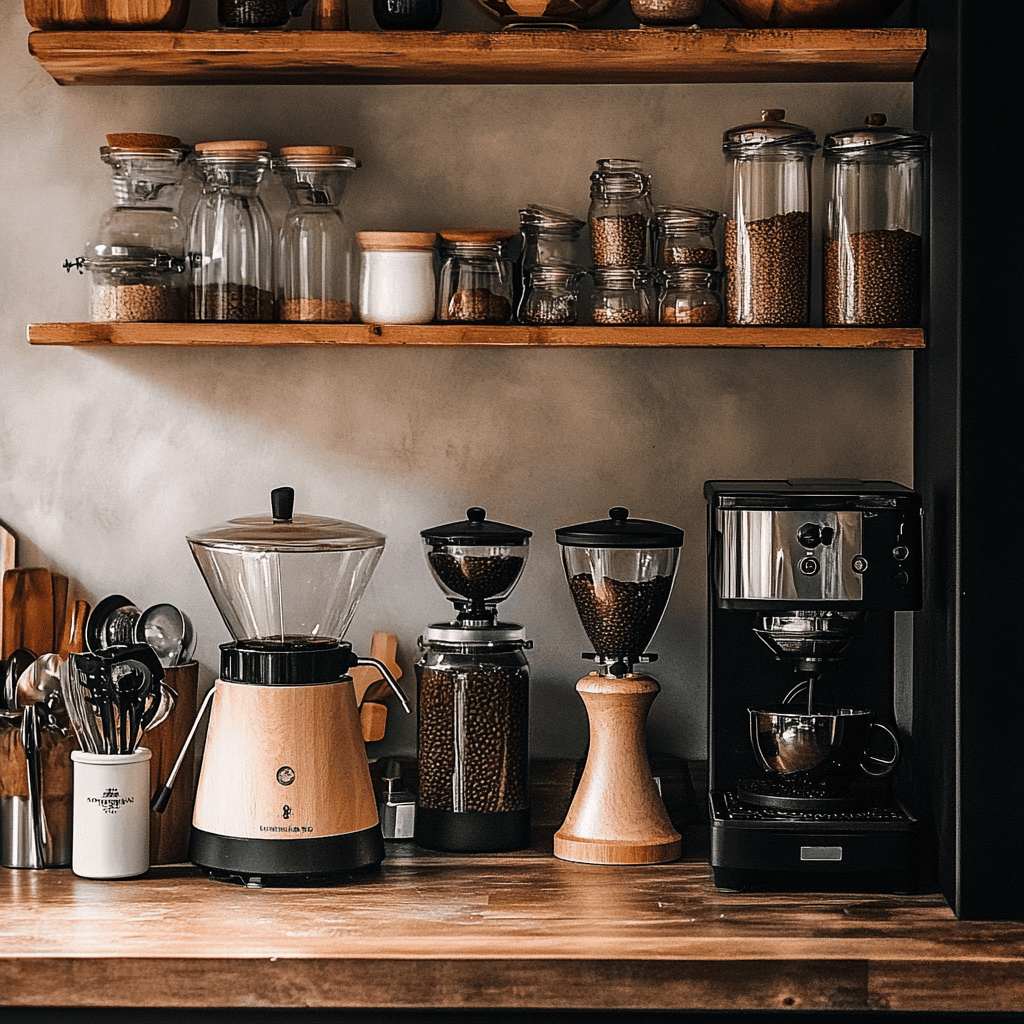The kitchen has long ceased to be just a place for cooking. Today, it is becoming a laboratory of aromas, where you can extract, mix and explore smells using familiar kitchen gadgets. Spices play an important role in perfumery , adding depth and character to compositions, and many devices created for processing food help to reveal and preserve aromatic substances, which makes them useful not only in gastronomy but also in perfumery.
How can you use a coffee grinder, distiller or French press not for its intended purpose, but to create aromatic essences and extracts? In this article, we will look at how household appliances help extract aromas and reveal complex perfume compositions.
Coffee grinder: grinding as a way to reveal aroma
A coffee grinder is one of the most accessible and useful tools for working with aromas. It is used not only for coffee, but also for grinding spices, herbs and other natural ingredients needed to extract aromas.
How a coffee grinder helps in perfumery:
● Grinds spices (cloves, cinnamon, cardamom) to release more intense aromas.
● Grinds dry herbs and flowers (lavender, rose, chamomile), facilitating their further extraction.
● Helps in the preparation of powders for aromatic sachets and dry perfume mixtures.
When using a coffee grinder, it is important to remember that the finer the grind, the more aromatic substances are released. However, grinding too finely can lead to a rapid loss of volatile compounds, so different grinds are selected for different ingredients.
Distiller: The Classic Method of Extracting Aromas
Distillation is one of the oldest methods of obtaining essential oils and aromatic essences. In the past, special devices were used for this, but today even in the kitchen you can use a distiller to extract pure scents from plants.
How Distillation Works:
- Plants or spices are added to a container with water.
- The liquid is heated to boiling point, causing the vapors to rise.
- Aromatic vapors condense in the cooled part of the device and collect as a liquid.
What aromas can be obtained through distillation:
● Essential oils (lavender, rosemary, mint, citrus peels).
● Floral hydrolates (rose, jasmine, violet).
● Spice essences (cloves, cinnamon, anise).
Using a distiller allows you to obtain pure, concentrated aromatic substances that can be used in perfumery, cosmetics or aromatherapy.
French Press: Gentle Extraction of Aromas
The French press, commonly used for brewing coffee and tea, is great for gentle aroma extraction. It allows you to extract essential oils from plant ingredients without overheating or damaging their structure.
How to Use a French Press for Aroma Extraction:
● Brew flowers (lavender, jasmine, rose) in warm water to obtain aromatic hydrolates.
● Infuse spices (cinnamon, cardamom, anise) to create natural aromatic infusions.
● Experiment with different combinations of plants to create complex aromatic compositions.
This method is suitable for those who want to obtain more delicate and fresh aromas without using complex equipment.
Freezing and cryoextraction: preservation of volatile compounds
Freezing is another way to preserve and extract aromas, especially useful for delicate floral and fruity components. Cryoextraction, although used industrially, can be adapted for home use.
How freezing helps preserve aroma:
● Freezing citrus peels before grinding helps preserve the essential oils.
● Deep freezing of flowers reduces the loss of aromatic substances during extraction.
● Freeze-drying (lyophilization) helps preserve flavor in powdered products.
This method works great for creating long-lasting aromatic essences that can be used in cooking, perfumery and aromatherapy.
Tinctures and Maceration: Extracting Aroma with Liquids
Tinctures and macerations are processes in which aromatic substances are extracted from plants using alcohol, oil or water. They produce long-lasting aromatic extracts that can be used in home perfumes or cosmetic products.
Maceration methods:
● Alcohol maceration – suitable for extracting aromas from vanilla, cinnamon, citrus peels.
● Oil maceration – used to obtain essential oils from lavender, rose, jasmine.
● Water maceration is a gentle method for extracting aromas from fresh flowers and herbs.
This method takes longer, but produces rich, long-lasting scents that can be used in perfumes, candles and cosmetics.
Kitchen gadgets can become real tools of perfume alchemy, allowing you to extract aromas and experiment with their combinations.
● A coffee grinder helps to grind spices and herbs to release their aroma.
● The distiller allows you to obtain pure essential oils and hydrolates.
● The French press is ideal for gently extracting aromas from plants.
● Freezing preserves volatile compounds, extending the life of fragrances.
● Tinctures and maceration help to extract persistent aromatic substances.
These methods allow you to create unique aromatic compositions at home, making the kitchen not just a place for cooking, but also a laboratory of smells.
Questions and Answers
Yes, a coffee grinder helps to grind spices, herbs, and flowers, enhancing their aroma and making further extraction easier.
A distiller is the most effective tool for extracting pure essential oils from plants and spices.
It allows you to gently extract aromas from plants without overheating, preserving their natural sound and beneficial properties.

